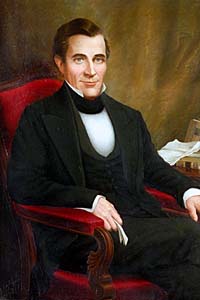Jared Irwin
| Jared Irwin | |
|---|---|
 |
|
| Governor of Georgia | |
|
In office January 15, 1796 – January 12, 1798 |
|
| Preceded by | George Mathews |
| Succeeded by | James Jackson |
|
In office September 23, 1806 – November 10, 1809 |
|
| Preceded by | John Milledge |
| Succeeded by | David B. Mitchell |
| Personal details | |
| Born | 1750 Anson County, North Carolina (now Mecklenburg County, North Carolina) |
| Died |
(aged 67–68) Washington County, Georgia, U.S. |
Jared Irwin (1750 – March 1, 1818) served twice as elected Governor of Georgia (1796–1798) and (1806–1809). He first was elected to office as a reformer based on public outrage about the Yazoo land scandal. He signed a bill that nullified the Yazoo Act, which had authorized the land sales. Challenges to land claims purchased under the former act led to the United States Supreme Court's hearing the case Fletcher v. Peck (1810). In a landmark decision, the Court upheld the land contracts, and ruled that the state law was unconstitutional in trying to valid contracts.
Jared Irwin was born in 1750 in what was then Anson County, North Carolina (his birthplace is now located in Mecklenburg County, which was formed out of the western portion of Anson County in 1762). His family moved to Burke County, Georgia when he was young.
Irwin fought in the American Revolution, in which he entered the army as a private. During the war, he demonstrated leadership and was promoted to the rank of colonel.
He was a member of the state convention that adopted the Constitution of 1789.
Soon after the end of the war, Georgia and other states rapidly tried to develop their frontier lands. It was an environment ripe for scandal and speculation, which took place in Georgia and other states. Because of public outrage about millions of acres of state lands' being sold for low prices to insider speculators, Irwin was elected Governor in 1795 to clean up the Yazoo land scandal. On February 13, 1796, less than two months after taking office, Irwin signed the bill nullifying the Yazoo Act. To make a public statement, he burned a copy of the Yazoo Act on the grounds of the capital. The legislature had just moved the capital to Louisville in response to the scandal.
During his second term, Irwin administered the state's second land lottery, as land sales and development were still a priority for the state.
...
Wikipedia
